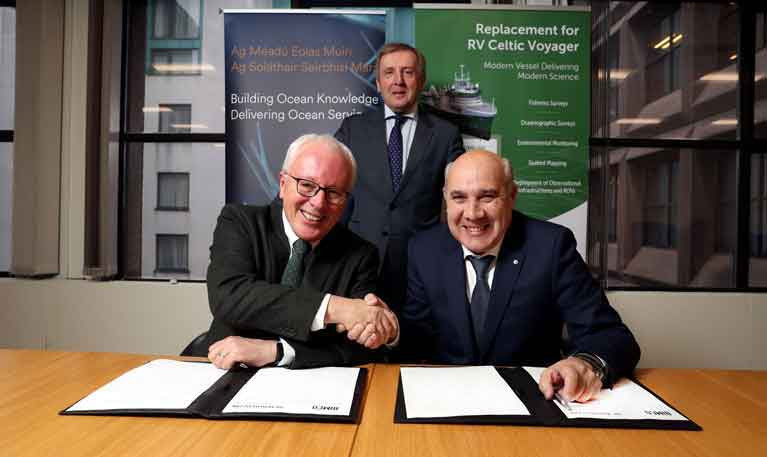The Marine Institute and Spanish shipyard Astilleros Armon Vigo S.A. have signed a contract for the construction of Ireland’s new state-of-the-art marine research vessel, following the completion of the design of the vessel by Skipsteknisk AS of Norway. This is a significant milestone with the build process contracted to complete in 2022.
As Afloat reported previously, the new ship Supporting the Government’s national integrated marine plan, Harnessing Our Ocean Wealth, as well as the national Marine Research and Innovation Strategy, the new 52-metre research vessel will form a critical part of the State’s maritime infrastructure. It will replace the RV Celtic Voyager and will be a sister ship to Ireland’s larger research vessel, the 65-metre RV Celtic Explorer.
The new vessel will support Ireland in addressing some of the research challenges of Brexit and the Common Fisheries Policy, as well as climate-induced impacts on our oceans. It will facilitate service demands under the European Maritime Fisheries Fund (EMFF) including the conservation, management and rebuilding of fish stocks and the long-term sustainable harvesting of marine biological resources. It will greatly enhance the Institute’s many research and data gathering activities in areas like marine biodiversity, marine spatial planning and ocean observation and monitoring. The vessel will also support a diverse range of marine operations, such as maintaining and deploying Ireland’s Marine Data Buoy Network which supports Met Éireann’s daily weather forecasts.
The new research vessel will be a modern, multipurpose, silent vessel, capable of operating in the rough seas of the Irish Exclusive Economic Zone (EEZ). It will be designed to incorporate the latest proven technologies to ensure that it operates as efficiently as possible, ensuring minimal fuel consumption and minimising the vessels environmental impact and carbon footprint.
Welcoming the signing of the contract to construct the new research vessel, Minister for Agriculture Food and Marine, Michael Creed TD said:
“This project, when completed, will ensure that the important work of the Marine Institute, including vitally important fisheries and oceanic research initiatives, which are also important in the context of Climate Action, will be significantly enhanced through the commissioning of a state-of-the-art new fuel-efficient research vessel. I am delighted that my Department has been able to provide the necessary capital funding to the Marine Institute to enable the new vessel to be delivered within the anticipated three-year timeframe.”
Dr Paul Connolly, CEO of the Marine Institute welcomed the signing of the research vessel build contract stating:
“This is an incredibly exciting moment in our ocean science history. The new national research vessel will allow Ireland to make a major leap forward in our understanding of the Atlantic. As we enter the UN Decade of the Ocean (2021 to 2030) it will ensure that Ireland continues to build our ocean knowledge and enhance our scientific understanding.”
“The significantly enhanced capabilities of the new research vessel will support a broad range of ocean stakeholders including policymakers, managers, industry, researchers, educators, students, coastal communities and the public. This knowledge is essential if we are to sustainably manage our oceans and empower Ireland and its people to safeguard and harness our ocean wealth.”
Based in Galway, the vessel will be used by the Marine Institute, other State agencies and Third Level Institutes to undertake fisheries, plankton, oceanographic and environmental research and surveys, as well as student training. It will enable Ireland to continue building on our achievements as leaders in seabed mapping. It will also allow for continued transatlantic surveys with international partners through AORA (Atlantic Ocean Research Alliance) and other collaborations, as well as research survey programmes funded through EU Horizon2020.
The new research vessel will be built at Armon’s shipyard facility in Vigo, Spain. The Spanish shipbuilding company Armon, have a reputation as a builder of highly advanced vessels, with more than 900 ships built and in service throughout the world’s oceans. The yard recently built the RV Svea, a 70-metre research vessel delivered to the Swedish University of Agricultural Sciences.
Mick Gillooly, Director of Ocean Science and Information services, Marine Institute highlighted that the nature of marine equipment has changed significantly since the launch of Ireland’s first research vessel, the RV Celtic Voyager back in 1997.
“This new research vessel will be one of the most advanced marine research vessels in the world. It will provide scientists with state-of-the-art facilities and technologies to undertake crucial research that will deepen our understanding of the oceans.”
The new research vessel will be 52 metres long and will be engineered to endure harsh conditions and the punishing weather encountered in the North-East Atlantic and will be able to spend 21 days at sea. In addition, this new vessel will be a silent research vessel, and will be designed to meet the stringent criteria of the ICES 209 noise standard for fisheries research. It will also support the remotely operated vehicle (ROV) and autonomous underwater vehicle operations, which enable the exploration of our deep ocean down to 3,000 metres.”
































































